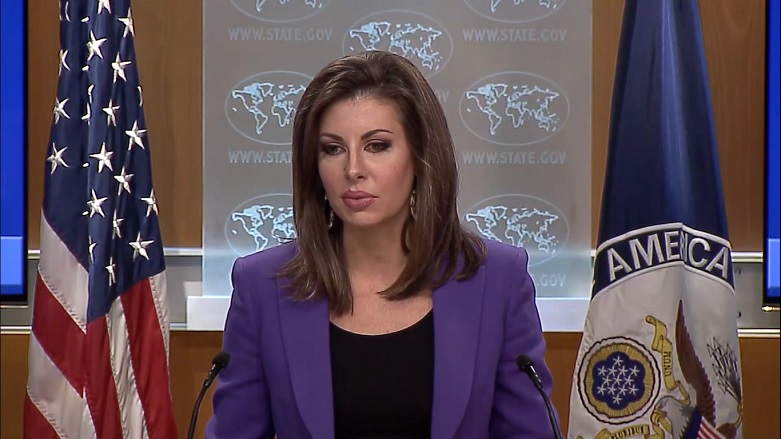US remains committed to maximum pressure on Iran, no difference with Europe, Japan on major issues

WASHINGTON DC (Kurdistan 24) — The US’ “maximum pressure campaign” against Iran “continues and will continue,” State Department Spokesperson Morgan Ortagus said on Monday as she stated that there was no major difference with America’s allies in Europe and Japan on the key issues involving Iran.
Noting that German Foreign Minister Heiko Mass was in Tehran on Monday and that Japanese Prime Minister Shinzo Abe will visit there later this week, Ortagus affirmed, “There is no daylight between us and our allies on the objective of denying Iran the ability to ever acquire a nuclear weapon.”
She also stated that there was no difference between the US and its allies regarding three other key objectives.
“We also agree about the threat of Iran’s ballistic missile program, its terrorist activities, and human rights abuses,” she said.
Last week, US President Donald Trump met with French President Emmanuel Macron to mark the 75th anniversary of the allied landings in Normandy that heralded the beginning of the end of World War II.
The two presidents affirmed a common stance toward Iran regarding its nuclear activity, ballistic missile program, and aggression in the region.
Read More: Japan’s Prime Minister to visit Tehran, as US, French leaders deny split on Iran
In a joint press conference on Monday with Germany’s Foreign Minister, Iranian Foreign Minister Mohammed Javad Zarif warned that America’s tough sanctions were “economic warfare” and the US “cannot expect to stay safe.”
Ortagus, however, dismissed Zarif’s hostile language. “Making threats, using nuclear blackmail, and terrorizing other nations is typical behavior for the revolutionary regime in Tehran,” she said.
Nonetheless, Ortagus added, “We will hold the Islamic Republic of Iran accountable for any actions against our people and our interests, regardless of whether they come from Iran or from its proxies.”
The US is giving serious consideration to beefing up its military presence in and around the Persian Gulf, The Wall Street Journal reported on Sunday.
For the past twenty years, the US has regularly maintained an aircraft carrier in the region, but recently the Pentagon moved forces out of the area to focus more on what it calls “peer competitors”—Russia and China—in line with the Trump administration’s national defense strategy.
But at the same time, US sanctions on Iran intensified significantly, as Zarif’s threats indicate. Gen. Frank McKenzie, who replaced Gen. Joseph Votel as CENTCOM Commander last March, has suggested that the drawdown of US forces “may have enabled Iran to feel it could threaten the US and its allies,” the Journal reported.
Early last month, the US rushed an aircraft carrier strike group, as well as B-52 bombers, to the region, saying that it had picked up intelligence of multiple threats from Iran.
The extra forces were sent at McKenzie’s request, and, subsequently, US officials affirmed that the deployments had served their purpose in dissuading Iran from any major attack.
Read More: Senior officials: US is successfully deterring Iran
While in Tehran, the German Foreign Minister affirmed that his country, along with France and Britain, were committed to implementing a financial mechanism that would allow trade with Iran, despite the US sanctions.
The US does not oppose that measure, Ortega explained, as she replied to a question from Kurdistan 24.
“Any payment systems in which there are goods or services” or any commodity “that is not sanctioned by the US government is fine,” she said. “But we would not support any payment mechanism from any country in the world that would allow businesses or entities or countries to engage in transactions with Iran that are sanctioned entities.”
“We are very grateful to the number of European businesses and banks who have taken these sanctions incredibly seriously and are complying with them,” she concluded.
Editing by Nadia Riva
